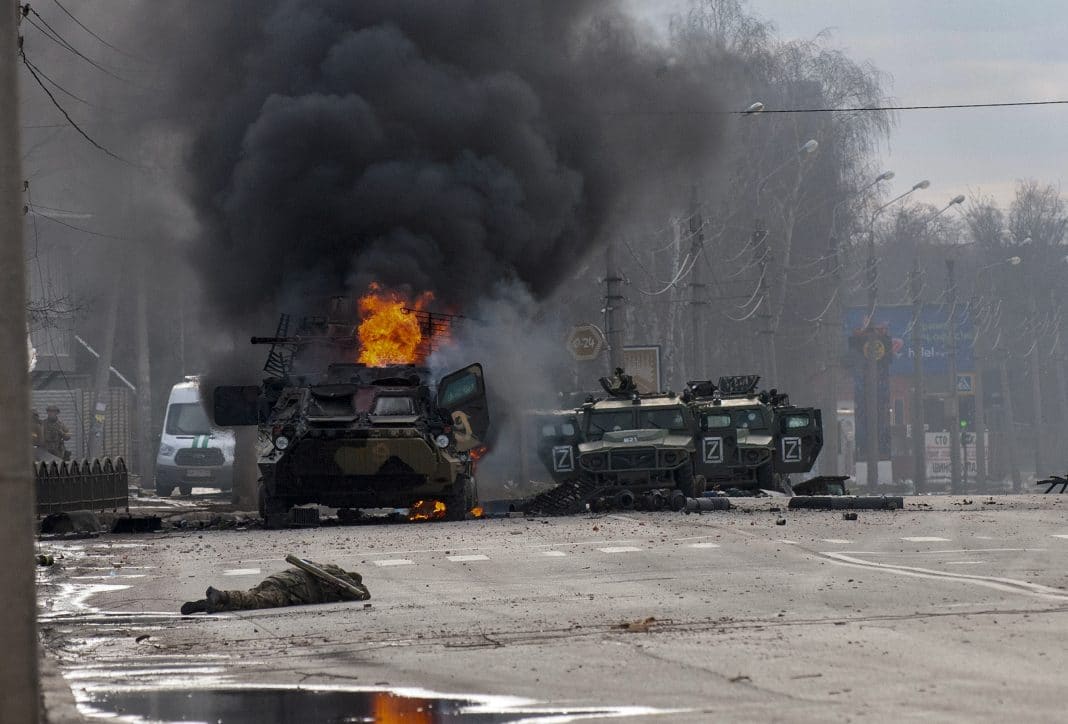Russian invasion forces claim to have seized two small cities in southeastern Ukraine and the area around a nuclear power plant, but ran into stiff resistance elsewhere as Moscow’s diplomatic and economic isolation deepened.
President Vladimir Putin put Russia’s nuclear deterrent on high alert on Sunday in the face of a barrage of Western-led reprisals for his war on Ukraine.
Blasts were heard before dawn on Monday in the capital of Kyiv and in the major city of Kharkiv, Ukrainian authorities said. But, Russian ground forces’ attempts to capture major urban centres had been repelled, they added.
Russia’s defence ministry, however, said its forces had taken over the towns of Berdyansk and Enerhodar in Ukraine’s southeastern Zaporizhzhya region as well as the area around the Zaporizhzhya nuclear power plant, Interfax reported.
Ukraine denied the nuclear plant had fallen into Russian hands, according to the news agency.
As Western governments mustered more support for sanctions against Moscow, diplomatic manoeuvring continued with the Vatican joining efforts to end the conflict by offering to “facilitate dialogue” between Russia and Ukraine.
Ukraine said negotiations with Moscow without preconditions would be held at the Belarusian-Ukrainian border. Russian news agency Tass cited an unidentified source as saying the talks would start on Monday morning.
US President Joe Biden will host a call with allies and partners on Monday to coordinate a united response, the White House said.
The United States said Putin was escalating the war with “dangerous rhetoric” about Russia’s nuclear posture, amid signs Russian forces were preparing to besiege major cities in the democratic country of about 44 million people.
Ukrainian President Volodymyr Zelenskiy told British Prime Minister Boris Johnson by phone on Sunday the next 24 hours would be crucial for Ukraine, a Downing Street spokesperson said.
As missiles rained down, nearly 400,000 civilians, mainly women and children, have fled into neighbouring countries, a UN relief agency said.
Western-led political, strategic, economic and corporate sanctions were unprecedented in their extent and coordination, and there were further pledges of military support for Ukraine’s badly outgunned armed forces.
In the Baltic state of Latvia, the parliament gave its blessing to any citizen who wanted to fight in Ukraine against the Russian invaders.
The rouble plunged nearly 30 per cent to an all-time low versus the dollar, after western nations unveiled harsh sanctions including blocking some Russian banks from the SWIFT international payments system.
Japan, South Korea and Singapore have also taken some financial measures.
China’s foreign ministry voiced disapproval of the use of sanctions, saying it opposed unilateral, illegal action. Regarding Putin’s order to put its nuclear deterrent on high alert, it said all sides should remain calm and avoid escalation.
Russia’s central bank scrambled to manage the broadening fallout of the sanctions saying it would resume buying gold on the domestic market, launch a repurchase auction with no limits and ease restrictions on banks’ open foreign currency positions.
It also ordered brokers to block attempt by foreigners to sell Russian securities.
British oil major BP, the biggest foreign investor in Russia, announced it would abandon its stake in state oil company Rosneft at a cost of up to $25 billion.
The European Union on Sunday decided for the first time in its history to supply weapons to a country at war, pledging arms including fighter jets to Ukraine.
Germany, which had already frozen a planned undersea gas pipeline from Russia, said it would increase defence spending massively, casting off decades of reluctance to match its economic power with military clout.
In New York, the UN Security Council convened a rare emergency meeting of the UN General Assembly, or all the United Nations’ 193 member states, for Monday.
Rolling protests have been held around the world against the invasion, including in Russia, where almost 6,000 people have reportedly been detained at anti-war protests since Thursday.
Get all the latest Canberra news, sport, entertainment, lifestyle, competitions and more delivered straight to your inbox with the Canberra Daily Daily Newsletter. Sign up here.



